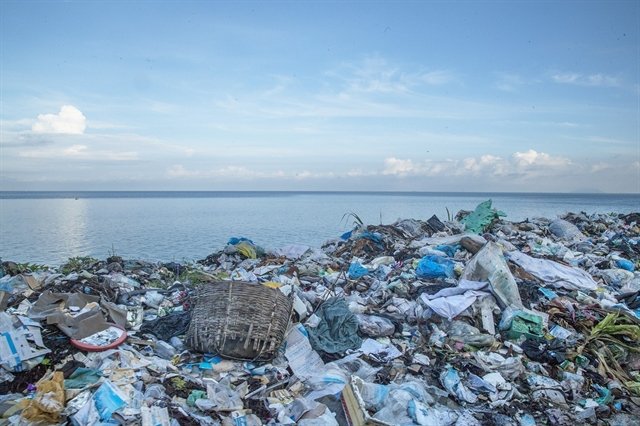July 28, 2023
HÀ NỘI — Việt Nam – strongly advocated for active participation in negotiating and building a global treaty to tackle plastic pollution as an active and responsible member of the Partnerships in Environmental Management for the Seas of East Asia (PEMSEA).
This reflected the spirit of solidarity and cooperation among nations in addressing current environmental challenges, the Ministry of Natural Resources and Environment’s Vietnam Agency of Seas and Islands has said.
Speaking at the conference on regional cooperation towards the global treaty on plastic pollution yesterday, Vietnam Agency of Seas and Islands deputy director Trương Đức Trí said the country always emphasises the importance of marine and island environmental protection and solutions on plastic waste and ocean pollution.
Trí said Việt Nam, as well as other nations in the world, are facing various environmental challenges, including climate change, natural resource depletion, and plastic waste pollution.
He said the Vietnamese Government attaches great importance to marine and island environmental protection, especially in conserving marine biodiversity, coastal environments, and addressing plastic waste and plastic pollution in our world’s oceans. These efforts aim to promote sustainable economic development in the marine sector.
The conference provided an opportunity for each country to prepare for the upcoming negotiation process to build the global treaty.
Once the treaty is adopted, it will serve as a testament to the spirit of solidarity and cooperation among nations in jointly addressing plastic pollution, he said.
To achieve these goals, Trí proposed two tasks that coastal nations needed to implement: making efforts to address urgent environmental pollution issues and effectively implementing the action plan for the sustainable development strategy of the seas of East Asia.
Legal constraints
Ramla Khalidi, Resident Representative of the United Nations Development Programme (UNDP) in Việt Nam emphasised the vital role of cooperation in addressing the increasing issue of plastic pollution, which requires the participation of Government agencies, NGOs, civil society organisations, development partners, and citizens.
She highlighted two crucial aspects to consider in the fight against plastic pollution.
“We must support the contributions of informal waste workers in the waste management system and explore how a global treaty could be built based on these contributions,” she said.
Achieving the ambitious goals of the global plastic pollution treaty will require sufficient financial resources, especially through innovative financial mechanisms to ensure full support for practical transformations, she said.

Waste dumped at Sơn Island in Kiên Giang Province. — VNA/VNS Photo Hồng Đạt
As a sponsor of the UNDP-Norway’s regional project titled ‘Enabling Plastic Pollution Innovation Challenge” (EPPIC), Norwegian Deputy Head of Mission Mette Moglestue said the EPPIC project provided opportunities for countries within and outside PEMSEA to sit together, discuss, and contribute to the negotiation process of the treaty.
The EPPIC project was initiated in 2021 in Việt Nam and Thailand, followed by successful implementation in Indonesia and the Philippines in 2022. In 2023, EPPIC expanded its scope to include Laos and Cambodia, highlighting the effectiveness of regional cooperation in addressing environmental challenges.
“All stakeholders must agree on different measures throughout the plastic lifecycle, from production, design to waste management. Moreover, the treaty must establish legally binding obligations to effectively minimise plastic pollution,” she stressed.
Nguyễn Mỹ Hằng, head of Vietnam Agency of Seas and Islands’ Science Technology and International Cooperation Division said Việt Nam is currently preparing for the negotiations.
Apart from the Government’s policies and mechanisms on curbing plastic pollution, Việt Nam has gained international support to conduct research, analysis, and evaluation of existing legal regulations pertaining to safeguarding the marine environment against plastic waste.
The country has provided capacity building for the ministry’s staff to prepare them for negotiations and analyse and forecast the negotiation scenarios related to the global treaty on ocean plastic waste.
It would conduct research to evaluate the potential policy implications upon its involvement in negotiating, signing, and implementing the global treaty, she said.
“The most important task is to develop a report that assesses the current production, use, disposal, recycling, and treatment of plastic products in Việt Nam. This report will contribute to the negotiation plan,” she said.
At the conference, a common document was agreed upon, outlining the collaborative strategy to address plastic pollution and contribute to the construction of a global plastic pollution treaty. – VNS


